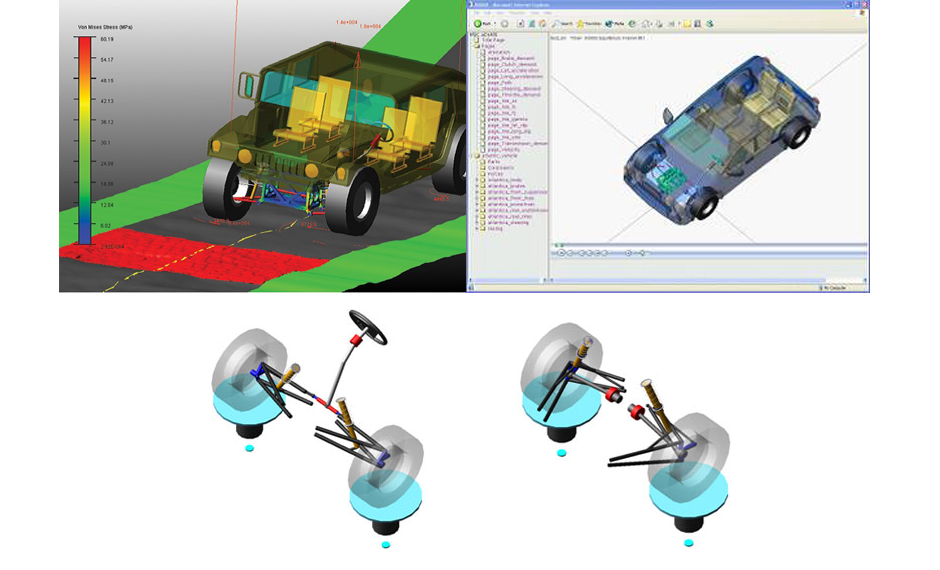Project Description
Adams/Car
Adams Solver는 general dynamic software로서 모델링 하는 System에 따라 다양한 해석을 수행할 수 있습니다. 그러나 각 산업 분야에 따라 특화된 해석 환경을 요구하는 경우가 많습니다. 자동차나 철도 차량 또는 항공 산업과 같은 특수한 해석 환경이 그 예입니다.
차량의 Ride & Handling에 대한 해석을 빼고 동역학 해석을 이야기 하기는 힘들 만큼 동역학 해석을 가장 많이 필요로 하고 또, 가장 많이 사용하는 분야는 자동차입니다. Adams에서는 이러한 요구에 맞추어 차량의 설계 및 시험을 위한, 산업특화 제품으로, Adams/Car 제품을 제공하고 있습니다.

Adams/Car의 응용 제품군은 엔지니어링팀들이 완전한 차량 및 차량의 서브시스템에 대한 가상의 시제품을 신속히 생성하고 시험할 수 있게 해줍니다. Adams/Car의 응용 제품군을 사용함으로써 자동차 엔지니어링팀들은 아주 짧은 시간안에 시험실이나 주행시험장에서 수행할 다양한 도로 조건들에 대한 성능검증이 가능합니다.

- 서스펜션, 스티어링 및 전체 차량의 거동 해석
- 차량모델에 대한 제어 시스템과의 쉬운 통합
- 각 부품들의 연결을 정의하기 위한 광범위한 연결 및 제한조건 라이브러리
- 탄성체 특성 부여, 제어 시스템, 마찰 조건 부여등을 통한 모델의 보완
- 미끄러짐, 수압 및 유압 가진기, 파라메터 설계변수 관계 지정
- 복잡한 대변형 설계에 대한 상세한 선형 및 비선형 결과 도출
- 모달 탄성체들 및 강체들의 조합에 대해서 상세하고 사용이 편리한 2D 및 3D 접촉 설정
- Explore the performance of your design and refine your design before building and testing a physical prototype
- Analyze design changes much faster and at a lower cost than physical prototype testing would require
- Vary the kinds of analyses faster and more easily
- Work in a more secure environment without the fear of losing data from instrument failure or losing testing time because of poor weather conditions
- Run analyses and what-if scenarios without the dangers associated with physical testing
- Perform a repeatable set of tests on a global basis, ensuring that you work with common data, tests, and, most important, results
- Model and simulate the ride quality of ground vehicles
- Create Adams/Car assemblies of suspensions and full vehicles
- Analyze model to understand their performance and behavior
- Use modeling elements important for ride quality as in Adams/Car models
- Analyze the modeling elements independently from other systems using a modeling element test rig
- Use four-post test rig to support a variety of time-domain analyses
- Apply component, suspension and full-vehicle templates specifically for heavy truck and bus
- Model multi-axle, multi-subsystem assemblies that are common in the trucking industry
- Perform component, subsystem, and full-vehicle analyses in one single environment
- Explore multiple what if design scenarios with the template-based parametric modeling approach
- Animate vehicle or subsystem motion onscreen
- Display graphs of key parameters
- Produce standardized test reports
- Model and simulate driveline components and study the dynamic behavior of the entire driveline during different operating conditions
- Explore the interaction between driveline and chassis components, such as suspensions, steering system, brakes, and the vehicle body
- Apply a specific torque to your driveline model
- Define a different friction coefficient for different wheels in your model
- Define a slope of your road to study the performance of your driveline model
- Alter the driveline geometry and analyze the driveline again to evaluate the effects of the alterations
- Bring a vehicle to its dynamic limits or near targets you define
- Improve handling, durability, or ride performance of the vehicle model based on predicted performance Adams/ SmartDriver computes
- Investigate system-level dynamics of the vehicle model, while requiring minimal setup
- Calculate a limit (maximum performance) speed profile over the reference path
- Check the speed profile using a fast, simplified vehicle model
- Perform an analysis of vehicle states over the trajectory, searching for path locations that cannot be traveled with the current target speed during the full dynamic simulation
- Calculate four additional limits using the parameters specified and theoretical limits of the vehicle
- Creates a speed profile that brings the vehicle to both vehicle limits and user-defined ones
- Use with Adams/Car, Adams/Chassis, Adams/Solver, or Adams/View for adding tires to your mechanical model in order to simulate maneuvers such as braking, steering, acceleration, free-rolling, or skidding
- Model the forces and torques that act on a tire as it moves over roadways or irregular terrain
- Calculate the forces and moments that tires exert on a vehicle as a result of interaction between the tires and the road surface
- Apply handling analyses to study vehicle dynamic responses to steering, braking, and throttle inputs
- Apply ride and comfort analyses to assess the vehicle’s vibrations due to uneven roads with short wavelength obstacles, such as level crossings, grooves, or brick roads
- Apply 3D contact analyses to generate road load histories and stress and fatigue studies that require component force and acceleration calculation
- Simulate full vehicle events (such as steady state drift, throttle off in turn, and constant radius)
- Simulate half vehicle events including dynamic load case and static vehicle characteristics
- Use with Adams/Insight to perform systematic experiments on vehicle model
- Study the effect of multiple design variations
- Optimize the design
- Address the robustness issue

